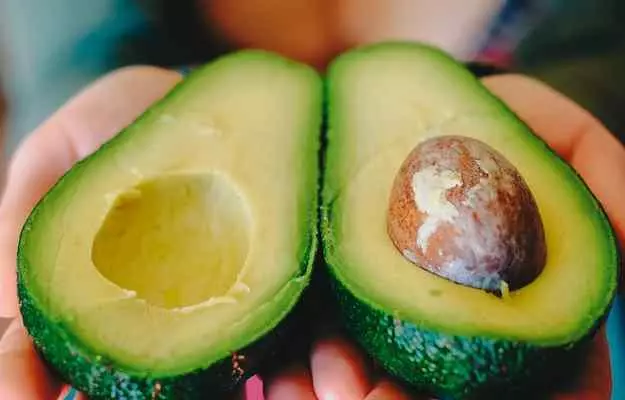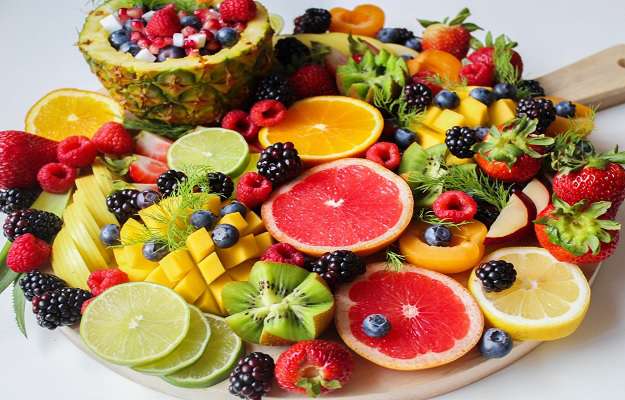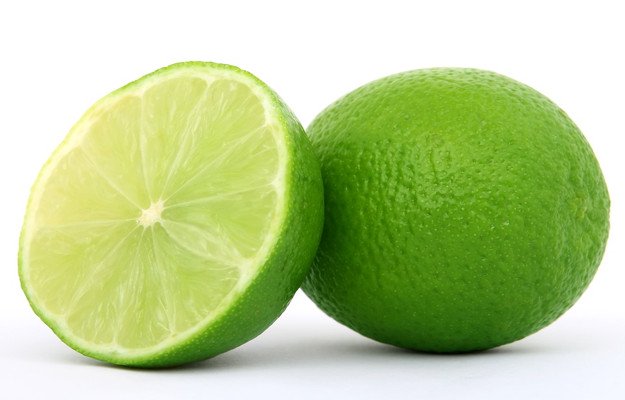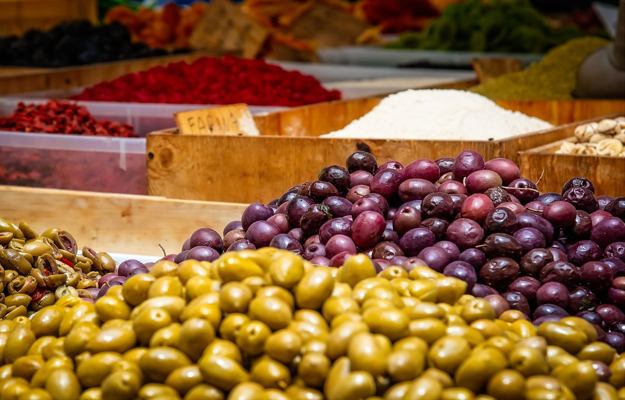Avocado, also known as butter fruit and alligator pear, is the fruit of a tree native to Mexico. It has a green or brownish covering that is thin and in some cases wrinkly. The flesh of the fruit has a nutty flavour and the soft texture of butter—in a properly ripe avocado, you can scoop the flesh out with a spoon.
Avocados contain vitamin K, vitamin C, vitamin E, vitamin B, especially B5, B6 and B9 (folate), as well as potassium. It also has minerals such as magnesium, manganese, copper and phosphorus in trace amounts.
It is considered to be a healthy fruit because it contains a high quantity of monounsaturated fats (9.8 grams monounsaturated fats per 100 grams of avocados). The majority of the carbohydrates present are in the form of fibre, which also makes it an attractive option.
Some basic facts about avocados:
- Scientific name: Persea americana
- Common name: Avocado, butter fruit
- Family: Lauraceae
- Parts used: Fruit
- Native region and geographical distribution: First cultivated in the Andean region in South America, avocados are now grown in Mexico, Peru, Australia, US, South Africa, Spain, Israel, Turkey, Kenya, Thailand, Vietnam and India, among other countries.
Avocado nutrition facts
Here is a look at the nutrient makeup of the fruit:
| Name | Amount | Unit |
|---|---|---|
| Energy | 160 | kcal |
| Water | 73.23 | g |
| Protein | 2 | g |
| Total Fat | 14.66 | g |
| Carbohydrate | 8.53 | g |
| Fibre | 6.7 | g |
| Sugars | 0.66 | 9 |
| Calcium | 12 | mg |
| Phosphorous | 52 | mg |
| Potassium | 485 | mg |
| Vitamin C | 10 | mg |
| Vitamin B-6 | 0.257 | mg |
| Folate | 81 | µg |
| Beta Carotene | 62 | µg |
Source: US Department of Agriculture
Avocado health benefits
Avocados are a great source of vitamins, minerals, omega 3 fatty acids and fibre. With less than one gram sugar in every 100 grams, avocados are also good for people living with chronic diseases like diabetes.
These are some of the health benefits of avocados:
Avocado benefits for digestion
Avocados contain a high amount of fibre (around 7 grams in half a fruit) and potassium, both of which aid the digestive process. Fibre is especially good if you are constipated as it helps to move the food along the gut and can also reduce the hardening of stool.
Since avocados are so nutrient-dense, having just half before a meal will make you feel quite full and you are less likely to overeat and give yourself an upset stomach.
Avocado for bad breath
Avocados are packed with nutrients that have antimicrobial properties. Eating avocados can kill some harmful bacteria in the mouth that cause bad breath.
Further, eating the fruit stimulates the production of saliva which is also good for oral health.
As mentioned above, avocados are good for overall gut health as they lower inflammation in the gut lining. Sometimes gut inflammation can lead to bad breath, so eating avocados may assist in solving this further.
(Read more: Digestive disorders)
Avocado for liver health
According to a Japanese study, avocados contain nutrients that slowed the progression of liver disease in lab rats.
Further, the large amount of monounsaturated fat may be beneficial to the liver as it cuts down on more harmful forms of fat. The high amount of fibre may assist in weight loss which would also put less stress on the liver. That said, it is important to eat fats—even good fats—in moderation.
Avocado benefits for eyesight
Avocados contain a high amount of antioxidants and also assist in the absorption of antioxidants from other foods. Additionally, they contain lutein and zeaxanthin which are known to be good for eye health. Therefore, eating avocados may help prevent cataracts and other common eye disorders.
Avocado for skin and hair
Avocado paste can be used as a moisturizer for the skin. The hydrating effects may delay wrinkling and may also conceal frown lines on the face. Avocados contain vitamin C and E which are known to have anti-ageing effects as they protect the skin from free radical damage. Avocados also contain biotin (vitamin B7), which is good for hair and nails. You can mash avocados into a paste and massage onto the scalp; vitamins B and E can control shedding, dryness and hair damage.
Avocado oil may have some sunscreen benefits as well—however, it can only provide protection up to SPF 14, depending on the formulation. Therefore, it must not be used as the only defence against the sun.
Read more: Home remedies for wrinkles and Sunburn
Avocado good for heart
Avocados are rich in potassium—in fact, they contain even more potassium than the much more popular bananas. Eating the right amount of potassium, as instructed by a certified nutritionist, can lower blood pressure. High blood pressure (or hypertension if it is chronic) is one of the leading causes of cardiovascular disease.
Avocados are over 70% fat. While this is alarming to hear, this is the good type of fat, or monounsaturated fat. Substituting the trans and saturated fats (like hydrogenated oils) in your diet with monounsaturated fats can be much better for your overall well-being. Consuming the recommended amount of monounsaturated fat can reduce LDL or low-density lipoprotein, which is the bad kind of cholesterol that leads to cardiovascular issues.
Read more: High cholesterol and What to eat when you have high cholesterol
Avocado during pregnancy
Avocados contain folate, which is associated with lower rates of miscarriage. Further, making avocados a part of regular pregnancy diet also reduces the likelihood of morning sickness. Overall, avocados are a healthy food option for mothers since avocados are nutrient-dense, low in carbohydrates and sugar.
Avocados for weight loss
Avocados are rich in fibre and low in carbohydrates, which is useful if you are trying to lose weight. It matters how avocados are consumed; since they make you feel full after eating just a little bit, they can be effective if taken just before a meal, or with a meal so that you don’t consume too many extra calories. By making you feel satiated, avocados may make you want to eat less food and assist in weight loss.
Read more: How to lose weight safely
Are you also troubled by obesity and are not able to lose weight even after a lot of efforts, then start using myUpchar Ayurveda Medarodh Weight Control Tablet today and control your weight.
Avocado good for arthritis
Avocados contain a high amount of vitamin K. Vitamin K plays an important role in calcium absorption which is known to strengthen bones. In this way, avocados could be beneficial for those with arthritis and osteoporosis.
Avocado may help to prevent cancer
Oleic acid, which makes up most of the monounsaturated fats in avocados, is said to reduce inflammation and may have a preventive role in colon cancer. Avocados also contain carotenoids which may prevent certain oral cancers as well. Folate and vitamin E, both of which are present in the fruit, may also have anti-cancer properties.
Please note that these insights are based on test-tube experiments or on the individual actions of the nutrients. There are currently no reliable studies that can confidently correlate avocados with a lower likelihood of cancer. Dieticians recommend avocados as a part of balanced diets since they are rich in good fats and abundant in vitamins that make up a wholesome diet.
Avocado for diabetes
Avocados are good for diabetics since they don’t cause a spike in blood sugar, can help reduce LDL cholesterol and may help with weight loss as well.
Read more: Diabetes: symptoms, causes, prevention, diagnosis, treatment
Avocado side effects
While avocados contain the good kind of fat, it is still not a good idea to eat them copiously since they can still cause an increase in weight. Instead, use avocados to make salads, guacamole (mashed avocados) or as a seasoning. The idea is to substitute avocados with less healthy foods and eat in moderation.
Those with kidney disease are also not recommended to have avocados because of their high potassium content. (Read more: chronic kidney disease)
People with latex allergies should avoid avocados.
Find Nutritionist in cities
References
- Celine Heskey, et al. Avocado Intake, and Longitudinal Weight and Body Mass Index Changes in an Adult Cohort Nutrients. 2019 Mar; 11(3): 691. PMID: 30909592
- Gowri Raman, et al. Avocado Consumption and Risk Factors for Heart Disease: A Systematic Review and Meta-Analysis Am J Clin Nutr . 2018 Apr 1;107(4):523-536. PMID: 29635493
- Mark Dreher, et al. Hass Avocado Composition and Potential Health Effects Crit Rev Food Sci Nutr. 2013 May; 53(7): 738–750. PMID: 23638933
- Keith Ayoob, et al. The Role of Avocados in Maternal Diets during the Periconceptional Period, Pregnancy, and Lactation Nutrients. 2016 May; 8(5): 313. PMID: 27213449
- USDA [Internet]. U.S. DEPARTMENT OF AGRICULTURE; Avocado, raw













